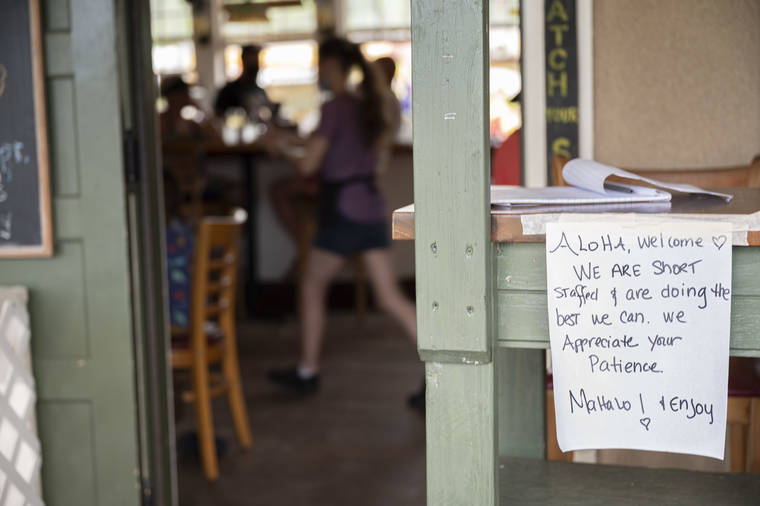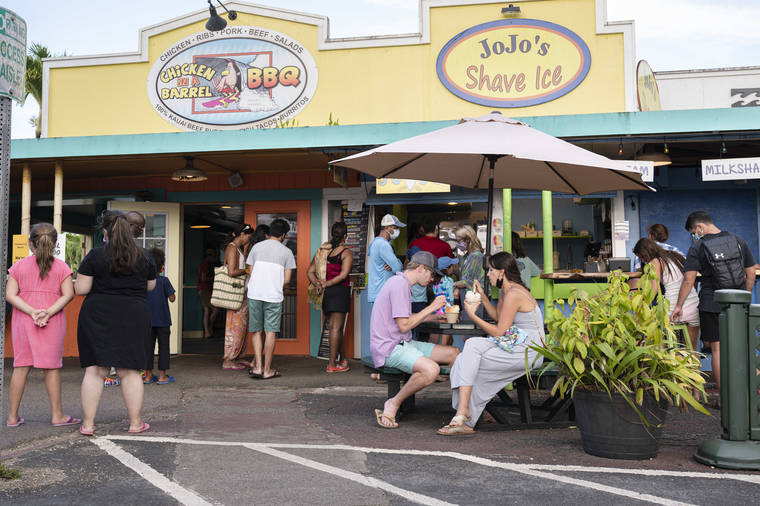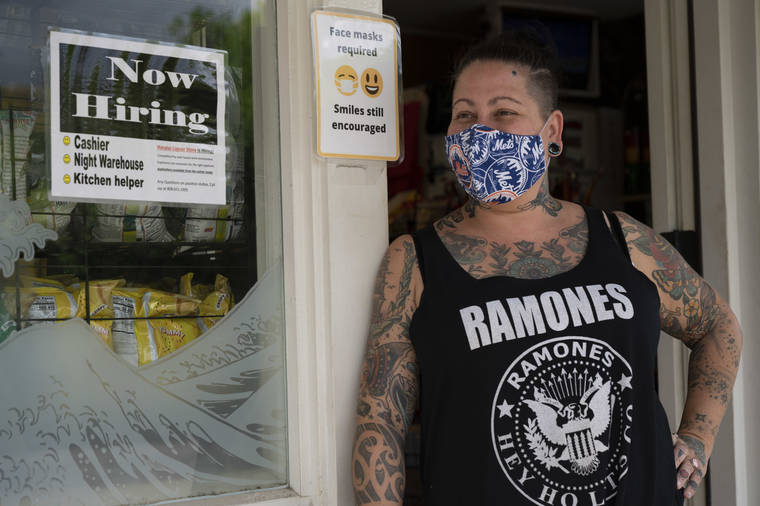HANALEI — Signs of the labor shortage in Hanalei are everywhere.
In just about every shopping center, the doors to several businesses are closed. “New operating hours” and “Help Wanted” notifications are posted up and down the street. Restaurants with long lines are having to turn would-be customers away.
“This is the most challenging time for hiring, harder than it ever has been,” Katie Krieger, front-of-house manager at Bar Acuda restaurant, said.
The Kuhio Highway’s closure limiting access to and from Hanalei has been exacerbating the effects of a workforce shortage that is being felt across Hawai‘i and the nation. Businesses have had to adjust operating hours to the times when employees can get through the convoy, and it has been hard to recruit new workers.
“We need that road to open,” said Aaron Irons, owner of Hanalei Bread Company.
Irons and other business owners are hopefully about to see some relief. The state Department of Transportation announced Friday that Kuhio Highway access into Hanalei will increase to two-way traffic beginning Sept. 4. Starting then, motorists will have access all day. Single-lane access will run from 7 a.m. to 5:30 p.m. Monday through Saturday. The road will be open in both directions during non-working hours for the road crew.
Only time will tell whether or not that will be enough for Irons to hire the additional 14 employees he would need to go back to operating normal business hours. Currently, the coffee shop closes at noon and is shut all day on Wednesdays. As Irons was stocking materials last Wednesday afternoon, he had to turn away a steady flow of people looking for beverages.
Of the 20 restaurant and retail businesses surveyed by The Garden Island last week, 19 reported that they could use more staff. Many of those businesses were no longer actively hiring and will assess if increasing staff and operating hours is feasible once the road reopens.
Kitchen staff is in high demand.
Server Ayden Drazic at Tahiti Nui wants more hours, but the restaurant has had to cut brunch service and is only able to open six days a week because they do not have enough kitchen staff.
“It’s hard. Everyone is trying to work together as a team,” Drazic said. “We have a hostess in the back right now cutting vegetables.”
Some business owners have adjusted to the labor shortage by taking on more hours themselves and relying heavily on family members, like Gabriella Hepburn, whose family owns and operates Tropical Taco.
Hepburn, along with just three other family members, was keeping the busy restaurant running smoothly on Wednesday. She said things were going well despite the road closure, but then added with a laugh that it can be “tough to work with family members.”
But the road closure has brought some unexpected benefits to retail businesses.
Long wait times at restaurants give diners ample time to browse retail shops while they are waiting for their tables, reported Tiare Olanolan, store manager at Titus Kinimaka Quicksilver Surf Shop. Despite cutting hours in half, the store hasn’t seen a drop in sales, Olanolan said. She’s even seen a big uptick in evening foot traffic.
“The night is way more poppin’ than what it used to be before the convoy,” she said.
Businesses are juggling more than just the Hanalei road closure, like the in-flux of COVID-19 restrictions, supply-chain interruptions and trouble getting deliveries. Businesses are still rebounding from the 2018 flood and pandemic travel restrictions that started in March of 2020 and brought tourism to a near halt for about a year.
Krieger and other business managers credited landlords for helping them keep their doors open. “They have been very gracious — very helpful to keeping us afloat,” said Krieger.
Tourists are noticing the interruptions, but many are staying positive.
Carl Stetson was waiting for a table at Kalypso Island Bar and Grill with his family on Wednesday night. “We are in paradise, so we don’t care (about the wait). It is just a different year,” he said.
Stetson is visiting from Missoula, Mont., with his family.
“What is interesting is that the same thing is happening on the mainland. You go to get an oil change or go to a restaurant. Everybody is short-staffed,” he said.






The government keeps paying people more to not work. Why would they work?